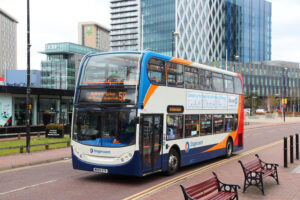Almost a third of bus services in England could be axed within weeks if the government does not make “critical decisions” to extend emergency funding, bus operators have warned.
Bus services were supported by grants during the pandemic when customers were advised to avoid unnecessary travel, but funding is due to expire on 5 April, with passenger numbers still only about 70% of pre-pandemic levels.
Operators normally have to give a minimum six weeks’ notice of route closures, meaning that many are already having to decide which will not be viable in the spring, when the Bus Recovery Grant payments end.
The Confederation of Passenger Transport, which represents the industry, said it expected to have a £350m “funding gap” next year, with operators also facing higher costs, especially in staffing, where a driver shortage has led to large wage increases.
Graham Vidler, chief executive of the Confederation of Passenger Transport, told a House of Lords committee hearing on Tuesday: “The consequences could be that bus operators are forced to reduce services by about 30%.
“The decisions that government makes in the coming weeks are really critical. If they are to provide a short-term, limited extension of the grant, it will allow the industry to recover.
“If the government steps away, not only will it undermine the ambitions set out in the national bus strategy, but in future to stay on track to achieve net zero they are going to have to rebuild those bus services again which will cost more money and be harder to attract passengers who have formed new habits.”
Phil Southall, managing director of the Oxford Bus Company, told the hearing that numbers had been recovering after the pandemic, but added: “The ‘avoid public transport’ messaging has left a legacy.”
Southall said that while the government had promised a £3bn investment in buses through funding for regional improvement plans, which would become available to councils and the industry from October, there was now £1.2bn available and the funding was oversubscribed.
“At the moment we have this gap, where we’ve got a bit of a cliff-edge, potentially looking at service reductions, which we’re trying to do everything we can to avoid,” he said. “We need that extra time to generate the patronage back.”
In private, other operators were more blunt. One, who requested not to be named, said companies had faced long delays in receiving promised Covid payments from the Department for Transport, adding: “The policy and administration is in chaos. Trust in the DfT is extremely low. The bus sector is hurtling towards disaster.”
The driver shortage, which intensified during the latest Omicron wave of the pandemic, was already affecting many bus services with frequent cancellations. But operators have warned that the financial situation is likely to mean more widespread route closures – in rural areas and also cities where cash-strapped urban transport authorities have to fund fixed-cost transit systems such as the Tyne and Wear Metro. The operator Go-Ahead has revealed initial cuts to routes, some serving deprived communities on the edge of Newcastle and north Tyneside.
South Yorkshire’s mayor, Dan Jarvis, on Tuesday wrote to bus operators First and Stagecoach to appeal to them to reconsider planned cuts to services and fare increases, which he said was “strategic shortsightedness of the worst kind”. However, he said he recognised the “genuine pressures” facing the industry, adding: “The government’s failure so far to extend Covid support for bus services is utterly reckless.”
A DfT spokesperson said: “The government has provided unprecedented support to over 160 operators to keep services running during the pandemic, and we’re working closely with the sector to understand the potential challenges and possible mitigations once it ends in April.”
The spokesperson said that more than 90% of recovery grant payments had been processed and the department had paid out more than £186.6m in Covid-related support to the sector between November and January.























0 Comments